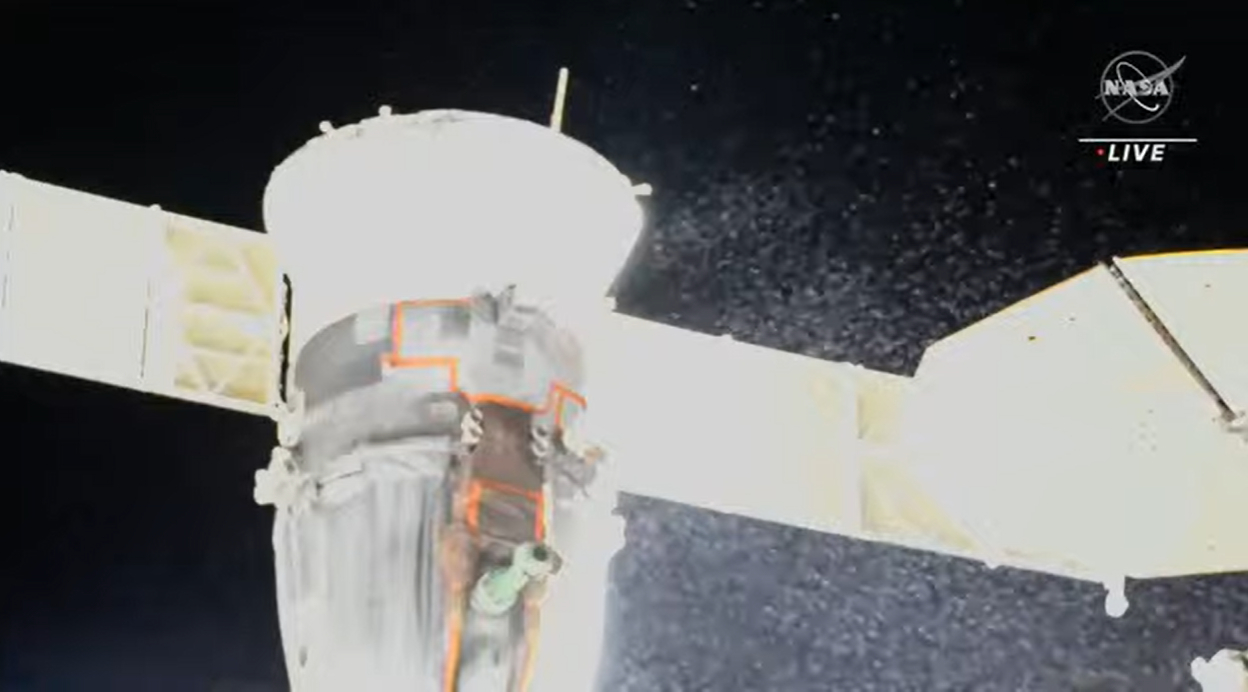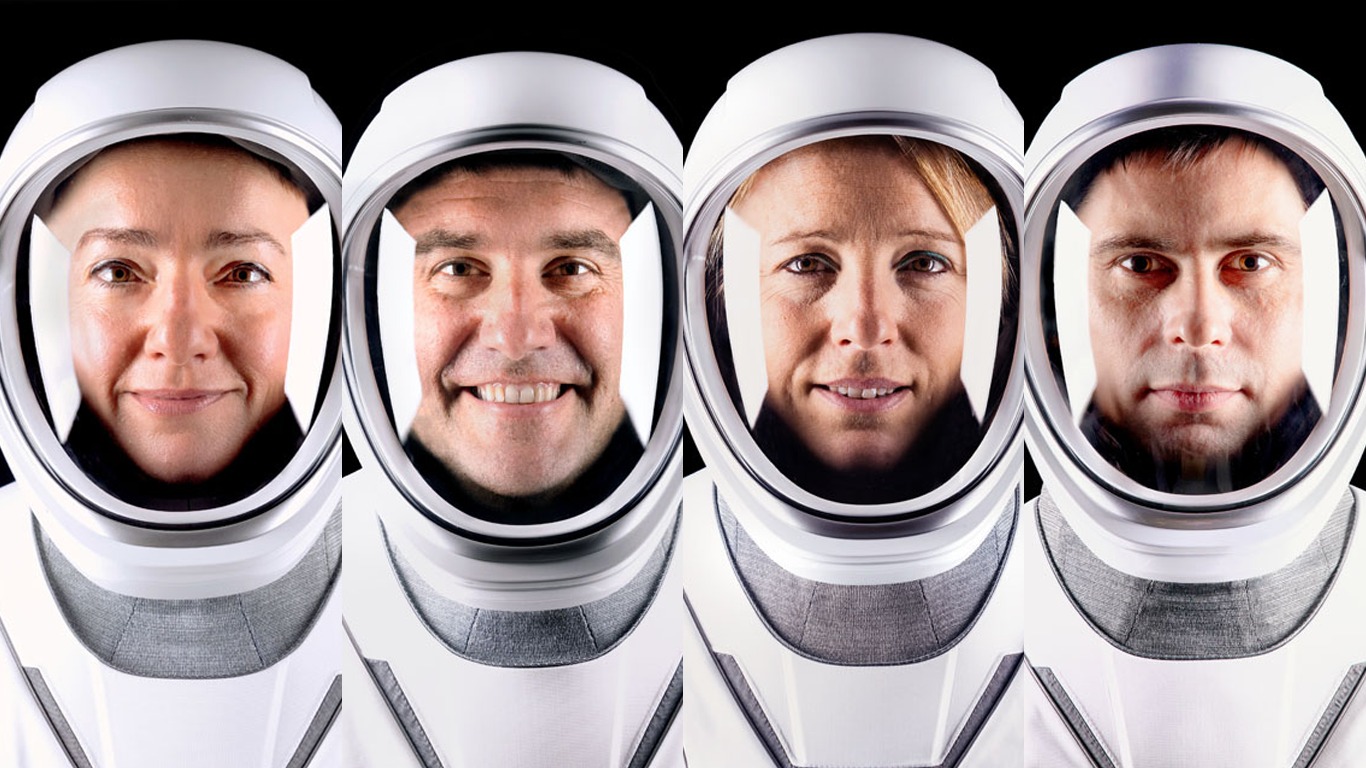Meteoroid strike may have caused Soyuz spacecraft leak, Russian state news reports
The International Space Station might be without a lifeboat for three of its crew members.

The Russian space agency will decide by the end of December whether to fly a space station crew back to Earth in a damaged Soyuz spacecraft.
The Russian federal space agency Roscosmos stressed there is no immediate danger regarding the damaged Soyuz spacecraft, which suddenly leaked coolant while docked to the International Space Station on Thursday (Dec. 14), potentially leaving three crew members without a lifeboat in case of trouble.
Roscosmos said in Telegram post on Monday (Dec. 19) that a special commission is in place to determine whether to return two cosmonauts and NASA astronaut Frank Rubio to Earth on the damaged Soyuz, or to send up a replacement craft (which would take no less than 45 days).
"There is no need for emergency evacuation at this time," Roscosmos officials stated in Russian (translation provided by Google). The space agency did not name a cause for the leak, although Russian state media agency TASS recently speculated it might have been a meteoroid associated with the ongoing Geminid meteor shower.
Related: Soyuz capsule damaged by uncontrolled leak while at space station, Russia's space agency says
If the crew cannot fly home aboard the beleaguered craft in March 2023 as planned, the Soyuz MS-23 spacecraft "can be quickly prepared for launch to replace the [damaged] Soyuz MS-22," Roscosmos officials wrote.
"Soyuz MS-23 is located at Baikonur and has already passed part of the tests before the scheduled launch in March," Roscosmos officials added, referring to the usual Kazakhstan launch site controlled by Russia, which services the ISS for both cargo and crewed launches.
Breaking space news, the latest updates on rocket launches, skywatching events and more!
The Soyuz MS-23 may be flown autonomously to the space station in as little as 45 days to replace the damaged spacecraft, Russia said, although one space safety expert told Space.com they would likely want a cosmonaut at the helm.
"I don't think Soyuz can dock completely autonomously. I believe that at least one person has to be on board," said Tommaso Sgobba, who is the executive director of the International Association for the Advancement of Space Safety (IAASS) and a former head of spaceflight safety at the European Space Agency (ESA).
Russian cargo ships do dock autonomously to the ISS, although the country experienced two seriously damaging collisions with earlier versions aboard the space station Mir in the 1990s.
Russian specialists have been assessing the state of the Soyuz for days, and Roscosmos says the temperatures inside are not above 86 degrees Fahrenheit (30 degrees Celsius) despite the lack of coolant. Before the spacecraft was shut down, temperatures got no higher than 104 degrees Fahrenheit (40 degrees Celsius).
Soyuz tests have shown "no other faults" besides the leak, and a new European robotic arm has examined the hull of the spaceship, where a "possible place of damage" was found near the instrument assembly. (Canadarm2 was also used overnight on Sunday, Dec. 18, but results have not yet been released.)
"At the end of December, the conclusions of the working groups will be heard and plans for the future will be outlined," Roscosmos added, saying that Soyuz spacecraft "have proven their reliability and survivability for half a century" since the line was introduced in 1966.
The last few years, however, have seen several incidents involving Soyuz craft, including a crewed abort during launch in 2018 and a leak that sprung on another Soyuz docked to the space station shortly after (which Roscosmos blamed on a NASA astronaut, over the American space agency's protests.)
NASA and Roscosmos have not yet said whether the leak on Thursday caused any damage to adjoining modules of the space station, or to any of the other ships that are nearby. NASA's last update on the leak was on Friday (Dec. 16) via a blog post.
Elizabeth Howell is the co-author of "Why Am I Taller?" (ECW Press, 2022; with Canadian astronaut Dave Williams), a book about space medicine. Follow her on Twitter @howellspace. Follow us on Twitter @Spacedotcom or Facebook.

Elizabeth Howell (she/her), Ph.D., was a staff writer in the spaceflight channel between 2022 and 2024 specializing in Canadian space news. She was contributing writer for Space.com for 10 years from 2012 to 2024. Elizabeth's reporting includes multiple exclusives with the White House, leading world coverage about a lost-and-found space tomato on the International Space Station, witnessing five human spaceflight launches on two continents, flying parabolic, working inside a spacesuit, and participating in a simulated Mars mission. Her latest book, "Why Am I Taller?" (ECW Press, 2022) is co-written with astronaut Dave Williams.
